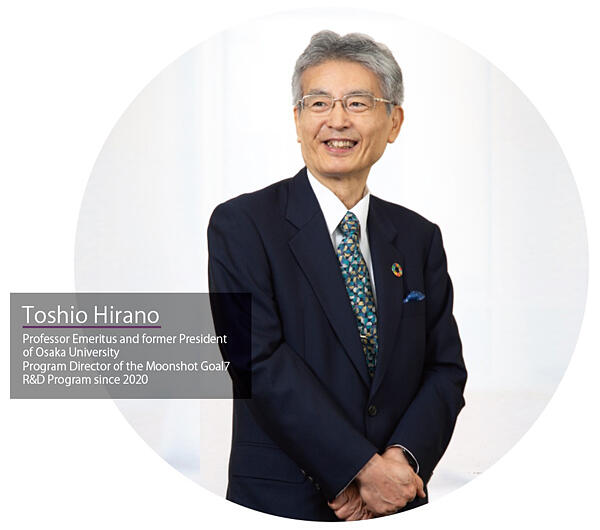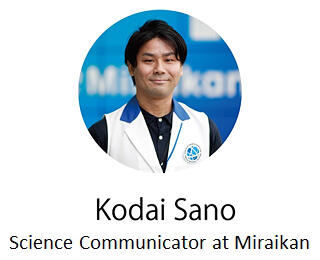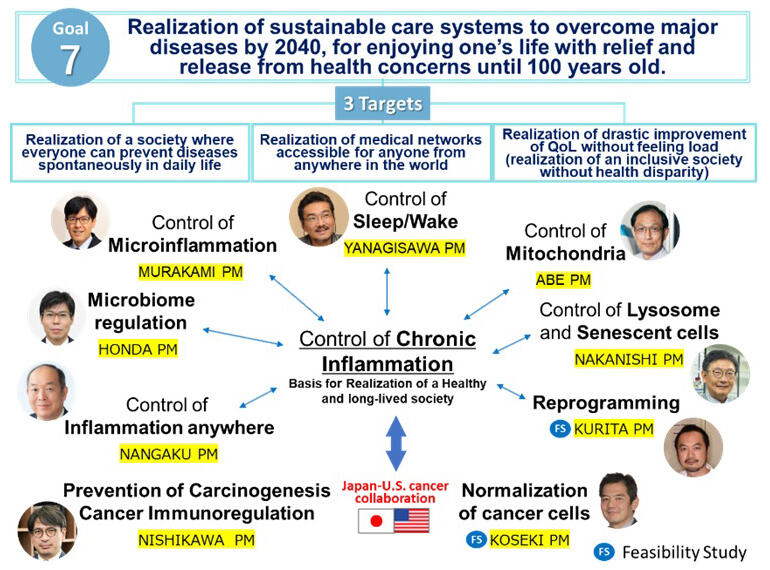The moonshot R&D program aims to create disruptive innovations from Japan. In this interview, we spoke with the Japan Agency for Medical Research and Development (AMED) to introduce Moonshot Goal 7: Realization of sustainable care systems to overcome major diseases by 2040, for enjoying one's life with relief and release from health concerns until 100 years old. The key to this program is a system to detect and control "chronic inflammation," which increases with aging. By detecting, preventing, and overcoming major diseases in their early stages in daily life, the program aims to reduce the gap between average lifespan and healthy life expectancy to as close to zero as possible. Kodai Sano, a Science Communicator at Miraikan - the National Museum of Emerging Science and Innovation, interviewed Program Director Toshio Hirano, Professor Emeritus and former President of Osaka University.


The Significance of Extending Healthy Life Expectancy
Living a "second" life
Sano: What is the aim of Goal 7?
Hirano: The average lifespan of the Japanese people has indeed increased, but the problem is healthy life expectancy. There is a gap of about 10 years between the average lifespan and "healthy life expectancy," the period in which people can live in good health without the need of nursing care and without suffering from chronic diseases associated with aging. In extreme cases, people may spend the last decade of their life bedridden or in an unhealthy state due to dementia or other conditions. Therefore, medical treatment to cure diseases while focusing on "quality of life" and preventive medicine to avoid unhealthy conditions are becoming increasingly important. In other words, to live "with relief and release from health concerns until 100 years old" is to reduce the gap between average lifespan and healthy life expectancy to as close to zero as possible.
Sano: That sounds like it will have a big impact on society.
Hirano: I think the impact on society would be significant. For example, if the gap between average lifespan and healthy life expectancy were reduced, there would be a significant reduction in the cost of medical care and welfare, which could be invested towards the future in education, science and technology, or social infrastructure, creating a virtuous cycle towards a brighter tomorrow.
Sano: It seems like our personal lives could also change drastically.
Hirano: Our outlook on life would change as well. Nowadays, after retiring, it is not easy for someone to take on new challenges. But if we were to live to be 100 years old and in good health, it would be possible to live a second life that is completely different from our first.
Sano: Is there anything you would like to do if you had a second life?
Hirano: It is exciting to think about contributing to human society as a corporate manager or politician with a medium‐ to long‐term vision from an international perspective or living my life as a novelist. I'm a specialist of immunology, but it would also be interesting to do research on completely different topics such as the origin of life, or aging and lifespan. Research in these fields have advanced very much in the last 10‐20 years.

Keyword is "Chronic Inflammation"
Controlling Age‐Related Diseases
Sano: How will you proceed with your research?
Hirano: I thought that a common keyword was necessary to maximize results, and chose "chronic inflammation," which is the main cause of various aging‐related diseases such as cancer, atherosclerosis, diabetes, and dementia. As we age, chronic inflammation occurs due to unhealthy habits such as obesity and smoking. In addition, the accumulation of various damages to cells and DNA leads to an increase in senescent cells. These senescent cells are known to cause chronic inflammation by releasing substances called cytokines, such as IL‐6. Chronic inflammation further increases the number of senescent cells.
Sano: So dealing with chronic inflammation is essential for good health.
Hirano: Nine project managers gathered with chronic inflammation as the keyword. Professor Takaaki Abe of Tohoku University is working on detecting the decline in mitochondrial function and reactivating it again; Lecturer Masakazu Kurita of the University of Tokyo is working on regenerating defective limb by tissue embryogenesis; Professor Makoto Nakanishi of the University of Tokyo is working on preventing and improving various aging‐related diseases by measuring aging levels and removing senescent cells; Professor Masaaki Murakami of Hokkaido University is working on detecting local micro‐inflammation using quantum technology and eliminating it using neuromodulation technologies; Professor Masashi Yanagisawa of University of Tsukuba is working on developing technology to control sleep, which is easily disrupted with aging, and induce hibernation in humans; Professor Masaomi Nangaku of the University of Tokyo is working on enabling remote medical care by connecting wearable sensor data to hospitals through a medical network; Professor Kenya Honda of Keio University is working to realize health management and medical care through the analysis of metabolites in intestinal flora; Deputy Director Haruhiko Koseki of RIKEN, is working to realize a society of zero cancer risk created by using cell lineage conversion; Professor Hiroyoshi Nishikawa of Nagoya University is working to realize a society with zero cancer risk through the control of chronic inflammation.
Sano: So, regenerative medicine and sleep are also involved?
Hirano: Senescent cells produce various cytokines that cause inflammation and induce senescence in the surrounding cells. On the other hand, it is now known that cytokines rejuvenate the surrounding cells, or in other words, to cause cell reprogramming. This is a kind of repair mechanism similar to that of an injury. As for sleep, diseases associated with chronic inflammation increase when sleep is short. It is possible that sleep disorders directly cause chronic inflammation, which will become clearer as we continue our work together as a team.
Sano: I see that is the significance of using chronic inflammation as a keyword.
Hirano: I feel that research related to measurement technology is also necessary. In the past, optical microscopy was invented and life science underwent a paradigm shift from taxonomy to cell biology. Now, quantum science technology is advancing, and if we apply such technology, we may be able to see phenomena that have never been observed before. First, we would like to use quantum science and technology to measure inflammatory states, senescent cells, or mitochondrial function with higher sensitivity.

Preventive Medicine Like Supplements.
Toward a future with more life choices
Sano: Do you think society will accept it?
Hirano: Depending on how you think about it, it is similar to supplements. Sort of like taking a capsule that activates mitochondria, removes senescent cells and chronic inflammation, and prevents cancer. So I believe it would become naturally accepted. Then we will have to talk about how insurance coverage will be provided, but as the enormous medical and nursing care costs decrease, we will be able to invest in this kind of preventive medicine. To what extent society will accept them is of course a question that researchers consider as citizens themselves, but it cannot be solved by researchers thinking alone. Therefore, what we can do is to keep sending out information such as by holding symposiums or through various means for the public.
Sano: Could you give a message to the younger generation?
Hirano: I want people to enjoy their lives until the very end. I believe that life is all about "how you live until the last moment." I hope our project will help you to live your life positively and cheerfully until your death. It would be great if you could still have a variety of options in life, even if you become ill or bedridden.




